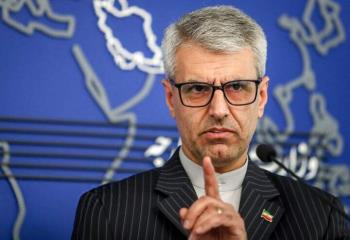Alwaght- Manuel Ochsenreiter, Editor in Chief of German monthly news magazine ZUERST, in an intervew with Alwaght said that Saudi aggression against Yemen is in reality a complicated plot orchestrated by the US to hold its hegmonial sway in the West Asia using its Arab stooges.
“We witness right now in Yemen a very typical geopolitical conflict between the West and its regional proxies and the resisting powers against Western hegemony. We can compare the frontlines with other geopolitical warzones such as Ukraine or Syria. In all these conflict zones the West tries to gain or secure its hegemonial dominance by using regional proxies while powers like Russia, China and Iran are calling for ceasefire and stabilization. The uprising of the Houthis [ also known as Ansarullah] is seen in the West and by its allies in the region, especially by Saudi-Arabia, as a serious threat to their dominance,” Manuel Ochsenreiter said in an exclusive interview with Alwaght news website.
The following is the full text of the interview:
Alwaght: In February 2012, Yemeni President Saleh, who ruled for 33 years was ousted. Mansour Hadi took the helm of power and followed the US agenda of the previous dictator. The Yemeni nation headed for another revolution and with the help of the Ansarullah Movement, removed him from power. Hadi fled to Saudi Arabia on March 26 and Saudi warplanes soon after started bombing Yemen. It seems that certain Western countries in covert cooperation with their Arab stooges are once again hatching fresh plots in the Middle East. What lies behind the Saudi-led airstrikes against Yemen?
Ochsenreiter: It is not at all a “covert operation” by the West; it is a very open and obvious operation. We witness right now in Yemen a very typical geopolitical conflict between the West and its regional proxies and the resisting powers against Western hegemony. We can compare the frontlines with other geopolitical warzones such as Ukraine or Syria. In all these conflict zones the West tries to gain or secure its hegemonial dominance by using regional proxies while powers like Russia, China and Iran are calling for ceasefire and stabilization. The uprising of the Houthis is seen in the West and by its allies in the region, especially by Saudi-Arabia, as a serious threat to their dominance. So it is not surprising at all that the Saudi government gets all kind of support of the West to “clear” the situation in Yemen. Western diplomats serve the propagandist pretext for the Saudi war crimes as well.
“The Saudis are just really deeply concerned about what they see as an Iranian stronghold in a failed state along their border,” US Ambassador to Yemen Matthew Tueller said in March 2015. But until today there is no evidence for Iranian support for the Houthis in Yemen.
But the Saudi terror bombing against the Yemeni people shows something else: Washington would like to see Saudi Arabia as its 'police man' in the Middle East region, the US government wants to 'delegate' those jobs the US army used to do itself in the past to 'employees' in the region. It is very obvious that the masterminds of the aggression against Yemen are not sitting in Riyadh, but in Washington and in the NATO center in Brussels.
Alwaght: The Saudi-led air campaign on Yemen is a blatant violation of international regulations and the rights of a sovereign state as a member of the United Nations. However, the UNSC adopted a resolution earlier and imposed sanctions on the revolutionaries and didn't condemn the Saudi aggression which has so far killed thousands of people. What's your perspective on that?
Ochsenreiter: Generally, supranational organizations like the UN are instruments of those who dominate them. For a very long time, since the collapse of Soviet Union, the term 'international community' used to be a camouflage expression for “Western interests”. So it is not surprising at all that the UN is a toothless tiger in those crises. One shouldn´t fall for the noble claims of supranational organizations, but becomes very suspicious. All the recent geopolitical conflicts which changed their battle ground literally into horrible bone mills and butcheries are conducted by the West with a propaganda theatre of 'human rights', 'democracy' and 'freedom'.
Alwaght: The Saudi monarchy claims that its air campaign against Yemen is aimed at stabilizing the region and is also an issue of national security. What do you think?
Ochsenreiter: The Saudi leadership needs a justification for its aggression against the Yemeni people. So, they simply turn it in their propaganda into a sort of 'preemptive assault'. The Saudi regime learned a lot from its masterminds in Washington. The Western aggressions against Afghanistan (2001) and Iraq (2003) were justified by the propaganda departments as actions for the 'national security' of the US and the transatlanticist world in general. And when Washington was pushing for a military strike against Syria in fall 2013, Barack Obama spoke as well about the 'national security' of the US. But the US public opinion wasn´t falling for that anymore.
Manuel Ochsenreiter, born in 1976 in Southern Germany, is Editor-in-Chief of German monthly newsmagazine ZUERST, part investigative journalist, and part reporter. He writes on politics, German and European foreign policy and Middle East affairs. Ochsenreiter reports especially about geopolitical topics in various European media. He visited several times Syria during the last three years and reported about the war of the Syrian Arab Army against the Western-backed terrorism. Ochsenreiter's articles and interviews are criticized blisteringly by German mainstream media because they oppose the established news coverage. He investigates as well about the influence of foreign NGOs and lobby organizations in Germany and about the work of German NGOs and foundations in foreign countries.
Interview by Javad Arab Shirazi


























